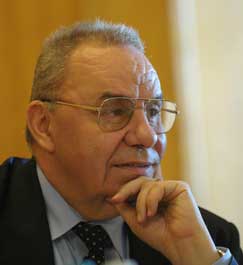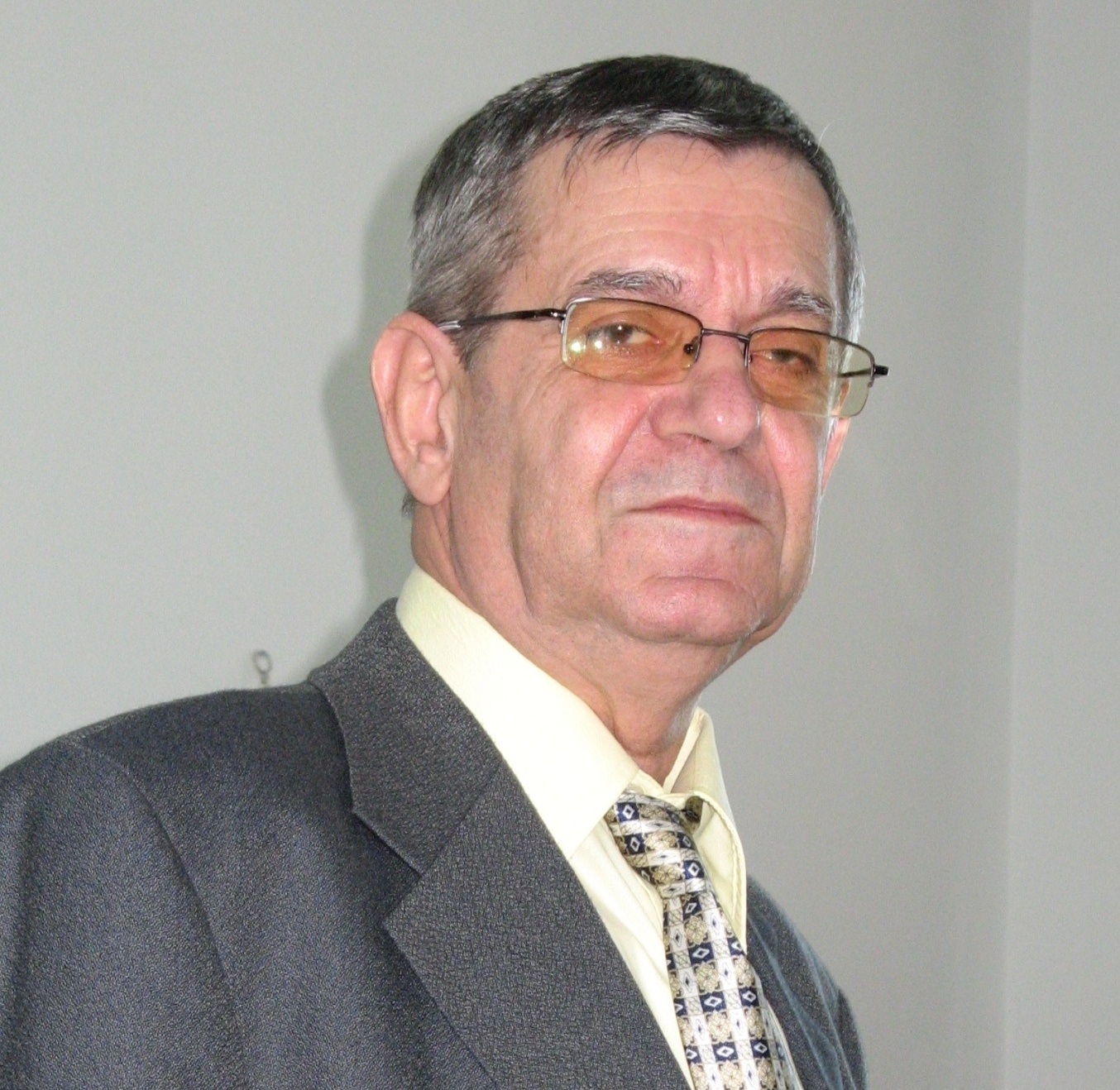POLITICS - November 12th 2004
In the interview for Jurnalul National, the director of the External Information Department (EID), Gheorghe Fulfga, speaks about his current job and about the institution he leads. He also said that he certainly wonât be leaving as an ambassador after the elections.
By GABRIELA ANTONIU

|
|
SIGNAL. Gheorghe Fulga drew attention upon the happenings in Transnistria at an International Conference in Ottawa.
|
Jurnalul National: Mister Fulga, you are sociologist by profession, so you are keen on all the things that involve man and humanity. Havenât the values which you believe (or used to believe) in been turned upside down by the nude reality, the one you see in the informing notes?
Gheorghe Fulga: In fact, I consider myself a person passionate for the humankind and its values, and, as a sociologist, I attentively watch the social and political evolutions, which I analyze depending on my own system of values. But I believe that, as a director of EID, the most important role of mine is to promote the fundamental democratic values of the Romanian state and of our society. I have to insure the specific contribution of EID to defending them from possible threats, which, unfortunately, donât avoid any country of the world. Having this job, offered me the possibility of strengthening my own system of values and made me sensitive towards the other sides of the contemporary worldâs reality and, in private, towards Romaniaâs place in the current geo-political context.
Who came with the idea of naming you in this position?
Though at the respective time I wasnât totally aware of the processes and mechanisms that make a secret service work, the arguments and the confidence reposed in me by the President of Romania made me say yes.
In the history books you will be remembered as the EID director from the moment in which Romania adhered to NATO. Thereâs no doubt you benefited from your predecessors. But the NATO moment coincided with the EID reorganization and with the announced demilitarisation. What did you have in plan?
I have never thought about the historical meaning of my activity, regardless of the institution I worked for. Beyond the meaning of fulfilling a strategic objective for the entire country, the admission of Romania in NATO repaid the sustained activity of EID for defending and promoting the national interest. Our stake was to enforce the credibility by connecting to the values, objectives and missions of the Euro-Atlantic information community. During this process we had to keep up with the changes in the international security environment generated by 11 September 2001. This explains the parameters of the EID reorganization. As for the demilitarisation, I would say that this is not a goal itself, but a natural step in the succession of the institutional reforms, in the context of the obligations assumed by our country as a member of the Euro-Atlantic community. I would like to emphasize that, on the other hand, this is a process that has to be approached attentively, that it cannot be made at anytime nor randomly. Only a solid organizational culture can support such a change, which doesnât mean giving up on discipline or rigour, but the consciously assuming of the strict rules, which are specific to an information department.
Discresion
In these four years in which you have been the leader of EID you were discrete. Should we understand that your statements saying you want a transparent EID has been a measure belonging to the politician Fulga or to the sociologist-professor Fulga?
Discretion is part of the set of values belonging to any information department. According to the law, EID cannot make public data regarding its actions, the sources or the used means and methods. Taking into account these limits, a correct perception of the Department, including the press, has been one of my priorities. The ones who want to see us can visit the www.sie.ro website, which, in the last three months, has been accessed by more than 10,500 people, 2,000 of which from abroad - if this can have any relevance for your readers.
How much can EID be open to cooperation with similar services? Isnât "isolation" one of the golden rules of the external information services?
We have to take into consideration that the threats against allied and communitarian security are also threats against national security, and speaking about "isolation" now seems to be unproductive. In the context of frontier-crossing development of some phenomena like terrorism and organized crime, the EID duties of defending national interests become more complex. This is why cooperation with partner information services, and mainly with the ones from the Euro-Atlantic states, has become a resource of the EID activities.
How vulnerable is Romania from the point of view of organized crime, frontier-crossing traffic, other countriesâ espionage, this meaning only the region we take part in?
National security is perceived as a dynamic process having a variable geometry, which imposes permanent relation to the new kinds of threat in the external environment: terrorism, mass destruction weaponsâ proliferation, illegal immigration, ethnic and religious conflicts, and thatâs not all. Most of them have a high rate of unpredictability, they interpenetrate more and more and, taking into account different zonal particularities, they tend to adapt to certain vulnerabilities or impossibilities of local action, making the security risk rate greater. No matter we talk about South-Eastern Europe, Caucasian zones, Central Asia, Northern Africa or Middle East, the indivisible character of security imposes a common department for the efficient administration of the main threatening vectors. For now, this exercise is equal to the allied consensus of "projecting stability", one of the reasons for which NATO is involved, for example, in Afghanistan.
Transnistria problem
Transnistria is a region which attracts terrorism and organized crime. How threatened and indignant about the regime in there should we feel?
Transnistria problem, which hasnât been regulated after 12 years since the start of the armed conflict on the Nistru River, which has lately transformed the region in a "paradise" of organized frontier-crossing crime, is a major security risk at the Eastern frontier of the European and Euro-Atlantic community. From this point of view, finding a solution for the Transnistrean conflict and re-establishing the territorial integrity of the Moldovan Republic are essential for insuring a stable climate in the neighbourhood of the EU and NATO. In its quality of frontier state of NATO and future frontier of the EU, Romania is directly interested in giving an expectable course to zonal evolution.
Romania is frontier country of NATO and is to become frontier country for the EU. As a director of EID, please make a sketch of the new area.
It is a complex issue. To be short, if Romania is permanently connected to evolutions on the European continent especially, then the meaning of frontier will be in our advantage. The frontier can become a positive interference space, favouring the culture mixture, which separates theoretically. If we take into account the West Balkansâ experience, we can identify the importance that the processâs domination can have for the national security.
What is the EID contribution to the observation of conflict zones in which Romanian soldiers are involved?
EID has a priority for the tensioned countries and regions, involved in conflicts, and especially the ones in which Romanians are involved. We act individually and, as well as in collaboration with partner services, taking into account the difficulties we encounter when trying to get information from the conflict areas. We actively cooperate with the other Romanian institutions that have representatives in the respective spaces, EID having the duty of insuring security of Romaniaâs diplomatic missions abroad, as well as the duty of protecting their personnel.
What are you going to do after the elections?
In the community of strengthened democracies, leading positionsâ in services donât usually coincide with the electoral calendar, because in this area activities are in "continuous fire". So, it is premature to offer you an answer for this question. But I can tell you what wonât happen: I wonât be leaving as an ambassador.
|
CV
|
|
Gheorghe Fulga was born on the 2nd of May 1951 in Agas, in the Bacau district. He graduated from the Philosophy Faculty of the University in Bucharest in 1975 and is Doctor of Sociology. Fulga is director of EID since February 2001. Before being named in this function he was deputy in Brasov (2000-2001), private system banking development counsellor, presidential counsellor and chief of the Internal Politics Department for the Presidency of Romania (1994-1996), prefect of Brasov, expert and counsellor at the Internal Politics Department for the Presidency of Romania (1990-1991), university professor at "Transilvania" University in Brasov, sociologist at "Tractorul" Brasov.
|








